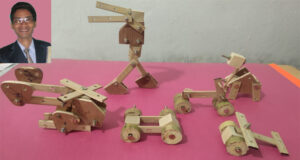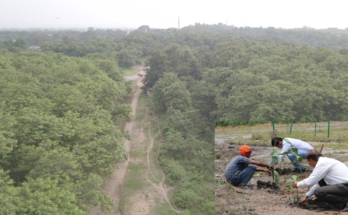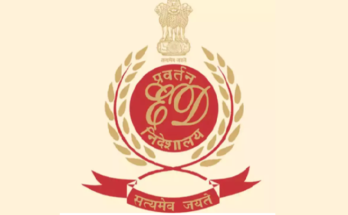 Ashis Sinha I Bokaro: The Innovation Center, run under the aegis of ‘House of Science and Culture Studies’ Chittarpur, Gola district of Jharkhand have developed a prototype of affordable, eco-friendly equipment based on STEM education for laboratory.
Ashis Sinha I Bokaro: The Innovation Center, run under the aegis of ‘House of Science and Culture Studies’ Chittarpur, Gola district of Jharkhand have developed a prototype of affordable, eco-friendly equipment based on STEM education for laboratory.
STEM (Science, Technology, Engineering and Mathematics) education is a method in which students can apply science, technology, engineering simultaneously while working on a project; one can learn mathematics too, informed Fayyaz Ahmad, Director of the center.
“It is an interdisciplinary approach to learning where rigorous academic concepts are coupled with real-world lessons as students apply science, technology, engineering, and mathematics in contexts that make connections between school, community, work, and the global enterprise enabling the development of STEM literacy and with it the ability to compete in the new economy,” he added.
All youths should be ready to think deeply and think well, so that they can become innovators, educators, scholars and leaders who, both today and tomorrow, will address the most important problems facing our country and our world. Not enough of our young people have access to quality STEM learning programmes right now, however, and too few students see these disciplines as springboards for their careers.
The implementation of science, technology, engineering and mathematics curricula and instructional programming is intended to help better prepare students in these fields of learning and build realistic implementations for how these concepts relate to the real world. STEM curriculum is structured to inspire students in their education and career paths to adopt these topics, as well as creativity and science. This emphasis will help train future generations to manage the toughest challenges of our planet better.
“In India, very few institutions are applying this method of education somewhere only in big cities, which are very expensive, he said adding “STEM education is the need of the hour for our country now.”
So I thought, to make a prototype of those apparatus that would be affordable, eco-friendly and easily available everywhere. Teachers, as well as students, can create such apparatus themselves so that STEM labs can also be established in small and budgeted schools in the rural parts of the country.
“My aim was also to establish or create social entrepreneurship by this means,” added Fayyaz.
In view of all those challenges, I, along with my team, have started to work on it. We used bamboo and wood as the basic item for this prototyping, he said, adding “the government is also encouraging to work on a new dimension of the use of bamboo.”
The Innovation Center is currently at work for mass production of such prototypes related to Science, Maths, EVS, Geography and History for primary and middle (class 1 to 10) classes, he said.
“As soon as the prototypes were ready, people of the Mahale caste would be trained and they would be given employment through Hunar Cottage,” added Fayyaz.
The team working on the prototypes is Fayaz Ahmed, the lead researcher in the STEM education project, Deepak Kumar, Tauqeer Ahsan Khan, Yogendra Upadhyay, Arbab Aaman, and Sanaullah are the Project Coordinators. Wasim Hasan, Aamir Iqbal and Ajmal Hussain are in the prototype construction team while Gulpsa Khatoon, Qamar Siddique and Aafreen Jabbar are in the project documentation team.
EoM



